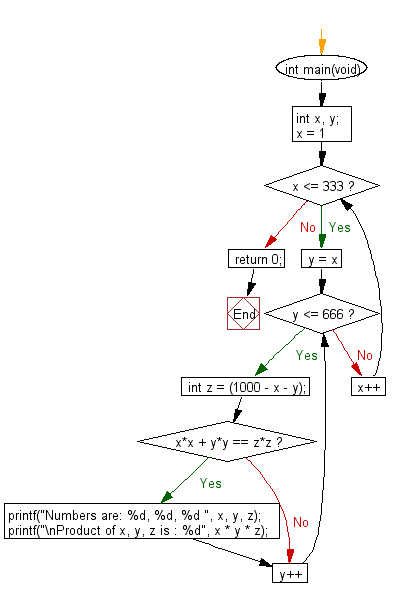C Exercises: Find the product xyz
C Programming Practice: Exercise-25 with Solution
A Pythagorean triplet is a set of three natural numbers, x < y < z, for which,
x2 + y2 = z2
For example, 32 + 42 = 9 + 16 = 25 = 52.
There exists exactly one Pythagorean triplet for which x +y + z = 1000.
Write a C programming to find the product xyz.
C Code:
#include <stdio.h>
#include <stdio.h>
int main(void)
{
int x, y;
for (x = 1; x <= 333; x++) {
for (y = x; y <= 666; y++) {
int z = (1000 - x - y);
if (x*x + y*y == z*z) {
printf("Numbers are: %d, %d, %d ", x, y, z);
printf("\nProduct of x, y, z is : %d", x * y * z);
}
}
}
return 0;
}
Sample Output:
Numbers are: 200, 375, 425 Product of x, y, z is : 31875000
Flowchart:

C Programming Code Editor:
Contribute your code and comments through Disqus.
Previous: Write a C programming to find the thirteen adjacent digits in the 1000-digit number that have the greatest product. What is the value of this product?.
Next: Write a C programming to find the sum of all the primes below ten thousand.
What is the difficulty level of this exercise?
Test your Programming skills with w3resource's quiz.
C Programming: Tips of the Day
Static variable inside of a function in C
The scope of variable is where the variable name can be seen. Here, x is visible only inside function foo().
The lifetime of a variable is the period over which it exists. If x were defined without the keyword static, the lifetime would be from the entry into foo() to the return from foo(); so it would be re-initialized to 5 on every call.
The keyword static acts to extend the lifetime of a variable to the lifetime of the programme; e.g. initialization occurs once and once only and then the variable retains its value - whatever it has come to be - over all future calls to foo().
Ref : https://bit.ly/3fOq7XP
- New Content published on w3resource:
- HTML-CSS Practical: Exercises, Practice, Solution
- Java Regular Expression: Exercises, Practice, Solution
- Scala Programming Exercises, Practice, Solution
- Python Itertools exercises
- Python Numpy exercises
- Python GeoPy Package exercises
- Python Pandas exercises
- Python nltk exercises
- Python BeautifulSoup exercises
- Form Template
- Composer - PHP Package Manager
- PHPUnit - PHP Testing
- Laravel - PHP Framework
- Angular - JavaScript Framework
- Vue - JavaScript Framework
- Jest - JavaScript Testing Framework
